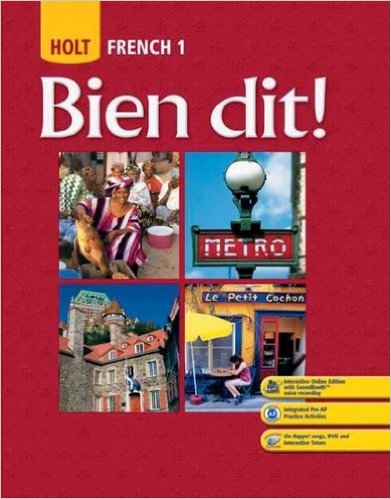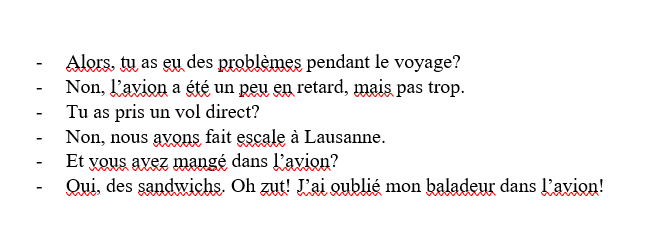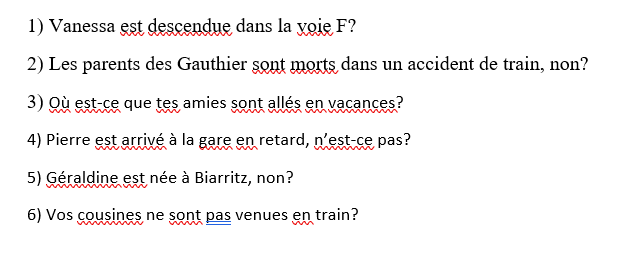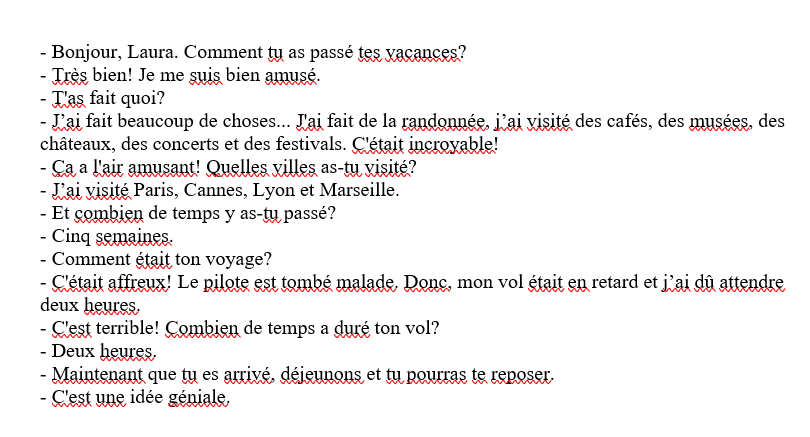
Bien dit! 1
1st Edition
ISBN: 9780030398889
Textbook solutions
All Solutions
Page 344: Grammaire
Exercise 26
Step 1
1 of 7
Did you have any problems during the trip? / The verb avoir (to have) has an irregular past participle ‘’eu’’, which is used with avoir as the helping verb. Therefore, it follows: (tu) as eu.
Step 2
2 of 7
Non, the airplane was a bit late, but not too much. / The verb être (to be) has an irregular past participle ‘’été’’, which is used with avoir as the helping verb. Therefore, it follows: (l’avion) a été.
Step 3
3 of 7
Did you take a direct flight? / The verb prendre (to take) has an irregular past participle ‘’pris’’, which is used with avoir as the helping verb. Therefore, it follows: (tu) as pris.
Step 4
4 of 7
No, we had a layout in Lausanne. / The verb faire (to do – in this context used to form a phrase ‘’faire escale (à)’’ – to have a layout) has an irregular past participle ‘’fait’’, which is used with avoir as the helping verb. Therefore, it follows: (nous) avons fait.
Step 5
5 of 7
And did you eat on the plane? / Manger is a regural verb ending in -er, therefore it has a regular past participle ‘’mangé’’, which is used with avoir as the helping verb. Therefore, it follows: (vous) avez mangé.
Step 6
6 of 7
Yes, some sandwiches. Oh, shoot! I forgot my walkman on the plane! / Oublier is a regular verb ending in -er, therefore it has a regular past participle ‘’oublié’’, which is used with avoir as the helping verb. Therefore, it follows: j’ai oublié.
Step 7
7 of 7

Exercise 27
Step 1
1 of 7
I looked for the tickets. / The verb chercher (to search/look for) is a regular verb ending in -er, therefore it has a regular past participle ‘’ cherché’’, which is used with avoir as the helping verb.
Step 2
2 of 7
You took the B lane. / The verb prendre (to take) has an irregular past participle ‘’pris’’, which is used with avoir as the helping verb.
Step 3
3 of 7
Madam Panin said goodbye to her daughter. / The verb dire (to say) has an irregular past participle ‘’dit’’, which is used with avoir as the helping verb.
Step 4
4 of 7
We saw the announcement board. / The verb voir (to see) has an irregular past participle ‘’vu’’, which is used with avoir as the helping verb.
Step 5
5 of 7
You (plural) asked where the dock is situated. / The verb demander (to ask) has a regular past participle ‘’ demandé’, which is used with avoir as the helping verb.
Step 6
6 of 7
The children waited for the train. / The verb attendre (to wait) has an irregular past participle ‘’attendu’’, which is used with avoir as the helping verb.
Step 7
7 of 7
1) J’ai cherché les billets.
2) Toi, tu as pris la voie B.
3) Mme Panin a dit au revoir à sa fille.
4) Nous avons vu le tableau d’affichage.
5) Vous avez demandé où se trouvait le quai.
6) Les enfants ont attendu le train.
2) Toi, tu as pris la voie B.
3) Mme Panin a dit au revoir à sa fille.
4) Nous avons vu le tableau d’affichage.
5) Vous avez demandé où se trouvait le quai.
6) Les enfants ont attendu le train.
Exercise 28
Step 1
1 of 5
The pilots had breakfast. / The verb prendre (to take – here used in a phrase ‘’prendre petit déjeuner’’) has an irregular regular past participle ‘’pris’’, which is used with avoir as the helping verb.
Step 2
2 of 5
The flight at 1.30 o’clock was late. / The verb être (to be) has an irregular past participle ‘’été’’, which is used with avoir as the helping verb.
Step 3
3 of 5
Mr. Corriveau drank coffee and read the newspapers. / The verb boire (to drink) has an irregular regular past participle ‘’bu’’. The verb lire (to read) has an irregular regular past participle ‘’lu’’. Both are used with avoir as the helping verb.
Step 4
4 of 5
You wrote a postcard to your friend. / The verb écrire (to write) has an irregular past participle ‘’écrit’’, which is used with avoir as the helping verb.
Step 5
5 of 5
1) Les pilotes ont pris le petit déjeuner.
2) Le vol de 13h30 a été retardé.
3) M. Corriveau a bu du café et lu le journal.
4) Vous avez écrit une carte postale à votre ami.
2) Le vol de 13h30 a été retardé.
3) M. Corriveau a bu du café et lu le journal.
4) Vous avez écrit une carte postale à votre ami.
Exercise 29
Step 1
1 of 12
– We had a horrible trip! / We use the phrase ‘’faire un voyage’’ with the verb faire in the present tense.
Step 2
2 of 12
– What happened to you? / We use the present perfect tense of the verb arriver (to arrive – in this context, to happen) with the verb être (to be) in inversion.
Step 3
3 of 12
– First, my brother forgot his passport. / We use the verb oublier (to forget) in the present perfect tense.
Step 4
4 of 12
– We had to return home to get it. / We use the verb devoir (have to) in the imperfect tense with the infinitive form of the verb rentrer (to return) and the verb obtenir (to get) in its infinitive form.
Step 5
5 of 12
That sounds bad. / We use the present form of the verb sonner.
Step 6
6 of 12
That was only a beginning… / We use the verb être in the negative imperfect form.
Step 7
7 of 12
There was a traffic jam on our way back. / We use the phrase ‘’il y a’’ with the verb avoir in the imperfect tense.
Step 8
8 of 12
– When we finally returned to the airport, it was too late. / We use the verb revenir (to return) with the auxiliary verb être (to be) in the present perfect tense (note that we are adding the s to the past participle – the participles used with the verb être agree with the subject in number and gender). We use the verb être in the imperfect tense.
Step 9
9 of 12
– That is horrible! / We use the verb être in the present tense.
Step 10
10 of 12
– Then we waited for another flight for 5 hours. / We use the verb attendre (to wait) in the present perfect tense.
Step 11
11 of 12
– I’m sorry that happened to you. / In French, when we express a subjective feeling, we use the subjective form (subjontif) – in this case in the past tense.
Step 12
12 of 12
– On a fait un voyage horrible!
– Que vous est-il arrivé?
– D’abord, mon frère a oublié son passeport. Donc, nous devions rentrer à la maison pour l’obtenir.
– Ah, ça sonne mal.
– Ce n’était qu’un début… Il y avait un embouteillage sur notre chemin de retour. Quand nous sommes finalement revenus à l’airoport, il était trop tard. Nous avons raté notre vol.
– C’est horrible!
– Ensuite, nous avons attendu un autre vol pendant 5 heures.
– Je suis désolé que ça vous soit arrivé.
– Que vous est-il arrivé?
– D’abord, mon frère a oublié son passeport. Donc, nous devions rentrer à la maison pour l’obtenir.
– Ah, ça sonne mal.
– Ce n’était qu’un début… Il y avait un embouteillage sur notre chemin de retour. Quand nous sommes finalement revenus à l’airoport, il était trop tard. Nous avons raté notre vol.
– C’est horrible!
– Ensuite, nous avons attendu un autre vol pendant 5 heures.
– Je suis désolé que ça vous soit arrivé.
Exercise 30
Step 1
1 of 7
Did Vanessa get out on the lane F? / The verb descendre (descend – in this context to get out) has an irregular past participle ‘’descendu’’, which is used with the helping verb être and agrees with the subject in number and gender. Vanessa is a woman (female subject), therefore we use ‘’est descendue’’.
Step 2
2 of 7
The parents of the Gauthiers died in a train accident, right? / The verb mourir (to die) has an irregular past participle ‘’mort’’, which is used with the helping verb être and agrees with the subject in number and gender. We have a plural subject (the parents), therefore we use ‘’sont morts’’.
Step 3
3 of 7
Where did your friends go on a holiday? / The verb aller (to go) has a regular past participle ‘’allé’’, which is used with the helping verb être and agrees with the subject in number and gender. We have a plural subject (the friends), therefore we use ‘’sont allés’’.
Step 4
4 of 7
Pierre arrived at the station late, didn’t he? / The verb arriver (to arrive) has a regular past participle ‘’arrivé’’, which is used with the helping verb être and agrees with the subject in number and gender. We have a male subject (Pierre), therefore we use ‘’est arrivé’’.
Step 5
5 of 7
Géraldine was born in Biarritz, right? / The verb naître (to be born) has an irregular past participle ‘’né’’, which is used with the helping verb être and agrees with the subject in number and gender. Since our subject (Géraldine) is female, we use ‘’est née’’.
Step 6
6 of 7
Your cousins didn’t come by train? / The verb venir (to come) has an irregular past participle ‘’venu’’, which is used with the helping verb être and agrees with the subject in number and gender. Since we have a subject that is both female and plural (female cousins), we use ‘’sont venues’’.
Step 7
7 of 7

Exercise 31
Step 1
1 of 6
Deux élèves sont arrivés en retards à la gare.
Step 2
2 of 6
Les filles sont montées dans le compartiment.
Step 3
3 of 6
Myriam est venue à la gare avec son copain.
Step 4
4 of 6
Le professeur est parti de la maison à 10h.
Step 5
5 of 6
La femme du professeur est allée voir les horaires des trains
Step 6
6 of 6
Les garçons sont descendus du train pour acheter des sandwichs.
Exercise 32
Step 1
1 of 4
Une femme est rentrée dans la gare.
Step 2
2 of 4
Deux femmes sont rentrées dans le train.
Step 3
3 of 4
Une femme est tombée sur le sol.
Step 4
4 of 4
Un homme est venu sur le quai.
Exercise 33
Step 1
1 of 9
Avec ma famille, nous sommes allés à Avignon le mois dernier.
Step 2
2 of 9
Nous sommes partis en voiture à 9h.
Step 3
3 of 9
Quand on est arrivés là-bas, nous avons déchargé la voiture.
Step 4
4 of 9
Ensuite, nous sommes partis visiter la vieille ville.
Step 5
5 of 9
Le soir, nous avons mangé dans un restaurant.
Step 6
6 of 9
Puis, nous sommes rentrés à l’hôtel pour dormir. Ma soeur et moi sommes allées dans notre chambre et nous avons dormis.
Step 7
7 of 9
Le lendemain, nous sommes allés au pont d’Avignon.
Step 8
8 of 9
Ma mère est montée sur le pont et mon père a danser avec elle.
Step 9
9 of 9
Puis, mon père est allé chercher la voiture et nous sommes rentrés à la maison à 17h.
Exercise 34
Step 1
1 of 12
Hi Laura. How did you spend your holidays? / We use passé composé of the verb passer (to spend) with the auxiliary verb avoir (to have).
Step 2
2 of 12
Great! I had a great time. / We use reflexive form (in passé composé) of the verb amuser (to amuse, to have fun) with the auxiliary verb être (to be).
Step 3
3 of 12
What did you do? / We use passé composé of the verb faire (to do) with the auxiliary verb avoir (to have).
Step 4
4 of 12
I did a lot of things… I hiked, visited coffee shops, museums, castles, concerts, and festivals. It was amazing. / We use passé composé of the verb faire (to do) with the auxiliary verb avoir (to have) to form a phrase ‘’faire de la randonnée’’ (to hike). We use passé composé of the verb visiter (to visit) with the auxiliary verb avoir (to have) in combination with indefinite articles to state that we visited SOME coffee shops, museums etc. We use imparfait of the verb être (to be) to state that it was great.
Step 5
5 of 12
That sounds fun! What towns did you visit? / We use the present tense of the verb avoir to form a phrase ‘’Ça a l’air’’ (that sounds, that feels like). We use passé composé of the verb visiter (to visit) with the auxiliary verb avoir (to have) in an inversion form (as-tu) to pose a question.
Step 6
6 of 12
I visited Paris, Cannes, Lyon, and Marseille. / We use passé composé of the verb visiter (to visit) with the auxiliary verb avoir (to have).
Step 7
7 of 12
How much time did you spend there? / We use passé composé of the verb passer (to spend) with the auxiliary verb avoir (to have) with the adverb ‘’y’’ representing France.
Step 8
8 of 12
Five weeks.
How was your trip? / We use imparfait of the verb être (to be).
How was your trip? / We use imparfait of the verb être (to be).
Step 9
9 of 12
It was awful! The pilot got sick. Therefore, my flight was late and I had to wait two hours. / We use imparfait of the verb être (to be) to form a phrase ‘’ C’était affreux’’. We use passé composé of the verb tomber (to fall) with the auxiliary verb être (to be) to form a phrase ‘’tomber malade’’ (to get sick). We use imparfait of the verb être (to be) to state that the flight was late and passé composé of the verb devoir (to have to) + infinitive form of the verb attendre (to wait) with the auxiliary verb avoir (to have).
Step 10
10 of 12
That’s terrible! How much did your flight last? / We use the present tense of the verb être (to be) and passé composé of the verb durer (to last) with the auxiliary verb avoir (to have).
Step 11
11 of 12
Two hours.
Now that you have arrived, let’s get lunch and then you can get some rest. / We use passé composé of the verb arriver (to arrive) with the auxiliary verb être (to be), the present form of the verb déjeuner (to have lunch), and the future form of the verb pouvoir (can) + the reflexive infinitive form of the verb reposer (to rest).
Now that you have arrived, let’s get lunch and then you can get some rest. / We use passé composé of the verb arriver (to arrive) with the auxiliary verb être (to be), the present form of the verb déjeuner (to have lunch), and the future form of the verb pouvoir (can) + the reflexive infinitive form of the verb reposer (to rest).
Step 12
12 of 12

unlock

